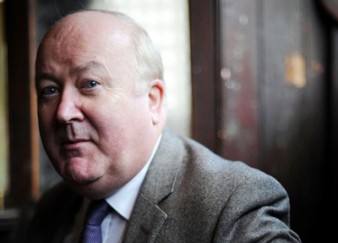
The second floor of Hodges Figgis on Dawson St was bustling and lively yesterday evening. A crowd of people circle around a single author, books clutched in their hand as the man of the hour, Conor Brady, greets them warmly. A table of copies of the book being launched, the third instalment of Brady’s crime series centring on Detective Sergeant Joe Swallow in the late nineteenth century, A Hunt in Winter is laid out to the left and right of the podium. This latest adventure details Swallow’s hunt for a dangerous murderer across Europe.
The small, intimate space is flooded with friends, family and fans of his series. Clearly respected in his field, he greets guests with handshakes and hugs, signing each copy with earnest appreciation for their support. Approaching him myself, I thank him for our earlier correspondence regarding the use of an extract from his latest novel, and he tells me with a warm handshake how flattered he is by our interest.
A long queue is being worked through at the till, dealing with the multitudes of people that are grasping the opportunity to buy the latest instalment of the series. Commissioning Editor of New Island Books – the publishing company behind the series – Daniel Bolger, calls for hush as the event begins. A sudden and electric silence falls over the large crowd gathered, as Dr Joe Mulholland takes to the podium.
Mulholland welcomes us all in Irish, and tells the crowd he has known Brady for the guts of forty years, since they were “young men in a hurry”, illustrating that he is an ideal candidate for Brady’s introduction. Mulholland pays homage to Ann, Brady’s beloved wife who sadly passed away in February 2015, stating that Brady “used writing as a weapon” to find that “glimmer of light” in the dark times that had befallen him, making the achievement of this third novel ever greater.
The pensive reverie is broken when Mulholland jokes that he has “never been a great fan of detective novels”, prompting laughter from the crowd and even a heckle from one man “you’d have to read them first to know that, Joe!” Mulholland delves deeper into the subject matter of the book in question, describing it as a “sociological, historical and perhaps even political portrait of our city in that time”. With a short aside to the similarities between both the character Joe Swallow and Brady’s mutual love for Tullamore Whiskey, Mulholland praises the novel as almost “factual fiction”. Its administration of Ireland in the nineteenth century and the development of its characters is what truly sets it apart from others of its kind. Imploring the audience to read it and its prequels, Mulholland finishes by telling the crowd to “find a quiet and comfortable place and read the trilogy in its entirety”.
With that finishing note, Conor Brady takes to the mic. Clearly moved by Mulholland’s speech, Brady begins by thanking him, his family and friends. He also gives gratitude to the publishers at New Island Books, who he likens to swans moving over a lake – “it looks effortless, but there’s a lot of paddling beneath the surface”. He tells the crowd about a lunch he had with his late friend, literary editor of the Irish Times, Caroline Walsh, just as the idea for The Joe Swallow series came to him. Immediately, she told him to go with New Island Books, and he has never looked back.
Returning to the topic of the book and the excerpt he is about to read, Brady states that Swallow seems to be doing well for himself. “He’s got the promotion to inspector. He’s made a decent woman out of Maria.” “But tragedy lurks… And I’ll say no more”, Brady adds. This is received with a chorus of good natured “aww” from the crowd. Brady begins a short reading from the novel, at a time when everything that could have gone wrong has gone wrong for Swallow. Unlike journalists, he jokes, this detective has made the mistake of following instincts rather than cold, hard evidence.
The excerpt consists of a conversation between the title character, Joe Swallow, and real historical figure John Mallon, who became assistant commissioner of the Dublin Metropolitan Police in the late eighteen hundreds – one of the only catholic men to do so at the time. Brady reads a beautiful, flowing colloquial exchange of dialogue between the two characters, bringing them to life with his mannerisms and expressions. Following raucous applause, he closes off with a resounding thank you to all present, and to those that have helped him with the journey of this novel.






